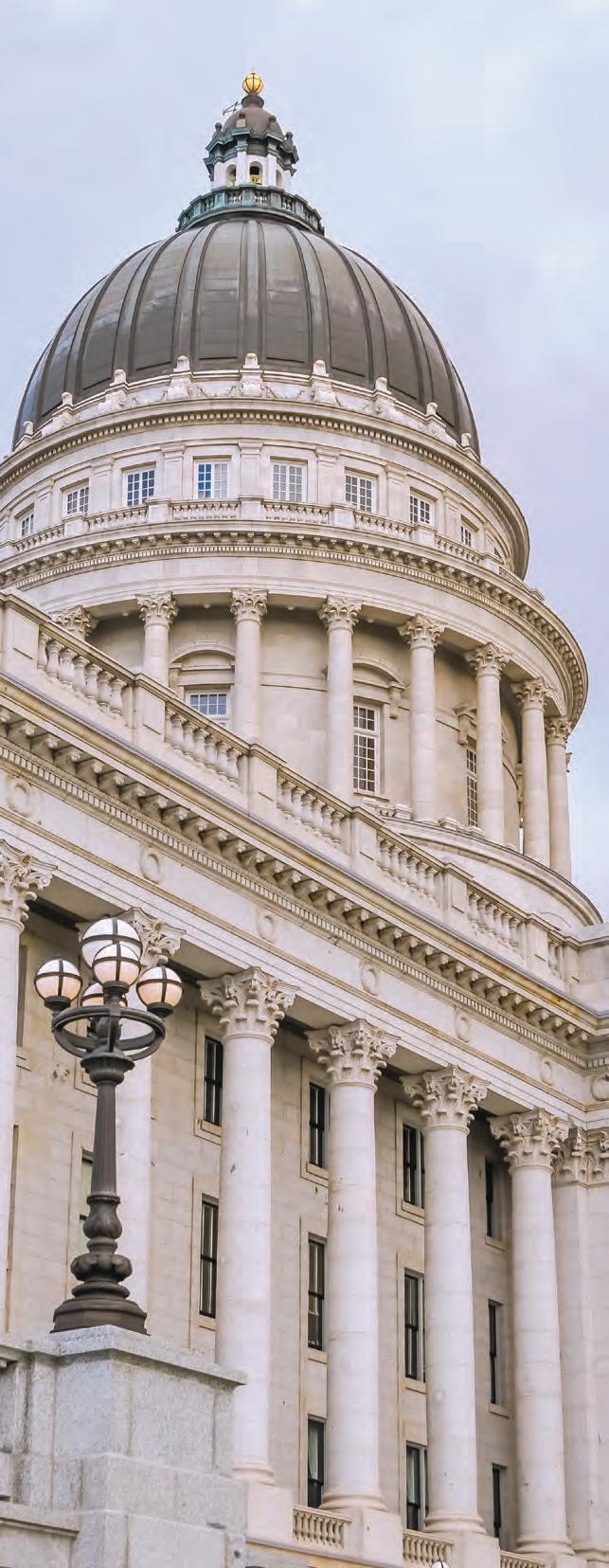
11 minute read
Chapter 1
from Real and Right
Car One is 10-41
State Street does not just extend the full length of the Salt Lake Valley; it declares itself the dominant road, running eighteen miles from the southern suburbs to the metropolitan center. It leads directly to a hillside where a domed neoclassical building majestically stands—the Utah State Capitol. The State Capitol was completed in 1916 and was subsequently celebrated with immense joy and pride by Utahns just two decades into statehood. In many ways, it symbolized the promise of the twentieth century. Citizens stood at the top of the granite stairs to view the panorama of the Salt Lake Valley and the American West as it unfolded before them. I too have stood at the top of those granite steps to overlook the Valley.
That building and I have a long history. Ever since I was a boy, after spending time with my father as he served in the legislature during the early 1960s, the State Capitol has held significance for me, as well as a special place in my heart. However, January 4, 1993, would link me to the Capitol building forever. It was Statehood Day, the ninety-seventh anniversary of Utah becoming America’s forty-fifth state, and inauguration day for me as Utah’s fourteenth governor.
Driving up State Street this particular day, the dramatic reveal of the Capitol complex at the top was unforgettable for me. Framed by bare trees in the winter gray, the massive white building radiated splendor. Giant flags adorned the great columns; soldiers milled about the grounds, attending to artillery pieces, which would fire a salute precisely at noon as the oath of office was completed. The place bustled with electricity and formality. Inaugurations may be the incoming governor’s show, but they’re the Utah National Guard’s production.
Jackie and I entered the building at the west doors. The rotunda was filled with row upon row of chairs; staging had been erected on the midpoint landing of the east rotunda steps that led to the Supreme Court. People had begun to arrive, and their early-bird status was rewarded by the Jay Welch Chorale and 23rd Army Band, both finishing brief rehearsals. Television camera crews were testing the equipment that would broadcast the ceremonies simultaneously on the state’s television and radio stations. Arrangements had been made for our children to be transported separately so they wouldn’t have to wait—a practical concern for Jackie, who knew the difficulty of containing five children ranging from two-and-a-half years old to sixteen. We were ushered to a committee room within the legislative wing to greet other podium guests and wait for events to start.
Ladies and gentlemen, the Governor-Elect, Michael O. Leavitt!“
Protocols called for each platform guest to be introduced separately while standing on the west stairs, then for the guest to proceed down a pathway to the east stairs where the stage stood. There were many guests; members of the Supreme Court, legislative leadership, former governors and first ladies, current and former statewide officers, newly elected officials, outgoing Governor Norm Bangerter and Mrs. Colleen Bangerter, and finally, the new First Lady. Jackie looked beautiful in a striking red jacket and black skirt. She waved at the crowd as she walked, with the poise and confidence acquired from many occasions in the spotlight as a pageant queen, musical performer, and elementary school teacher.
I was introduced last, accompanied by Adjutant General John Matthews, who would conduct the ceremony. As I stood on the far landing, a man I had known for many years was sitting in the audience directly behind where I was to be introduced. He apparently had a matter he wanted to lobby the new governor about, and I guess he thought this was the perfect chance. He tugged on my pant leg. I looked down to acknowledge him, expecting we would exchange smiles. “I need to talk with you about…” his voice trailed off. Timing is everything. “Do you think we could talk about this later?” I whispered back as the announcer intoned, “Ladies and gentlemen, the Governor-Elect, Michael O. Leavitt!” It was one of the earliest reminders of the duality of elective office. I was both chief executive and public servant.
On I went toward the stairs, and what a lovely walk it was. The band played a Sousa march, and the crowd was made up mostly of my friends and supporters. There were smiles, waves, winks, and thumbs up as I passed. We were all there together to share this particular milestone in both the state’s and my history. They stood and applauded; I walked and choked back tears.
We reached the bottom of the white marble stairs. I intuitively took the steps two at a time, realizing halfway up that I had taken my military escort, General Matthews, by surprise with my double-time ascent. I paused to wait for him. We both laughed and finished the climb. It was a spontaneous expression of how I felt—ready to get started with the job. Possibly, too, it was a younger man’s impatience: at forty-one, I was the second youngest governor in Utah history.
Once settled in my seat I could see the faces of all the people I love the most. Jackie was by my side; I could see my children, dad and mom, and Jackie’s parents. Both grandmothers were there, as well as my brothers and their families, friends, the campaign team who had fought long odds and won. One would like to savor a moment like that, and I wish I could report some profound thoughts.
But up to this point, it was mostly an adrenaline rush constrained by the practical considerations of simply carrying out the process. There was only one nagging little worry. I reminded myself more than once, “Do not mess up the oath.”
Chief Justice of the Supreme Court Richard Howe officiated. Jackie stood by my side, holding my brown leather Bible, upon which I would swear an oath of office five times over the next sixteen years. Justice Howe began: “I, Michael O. Leavitt.” I took a deep breath and in a strong voice designed to push away the tears welling in my eyes, I spoke, departing slightly from the script: “I, Michael Okerlund Leavitt, do solemnly swear...” The use of my middle name was an important tribute to my heritage and a way of honoring my maternal Okerlund grandparents. The oath went off without hitch. A dozen seconds to complete, and with that I was governor.
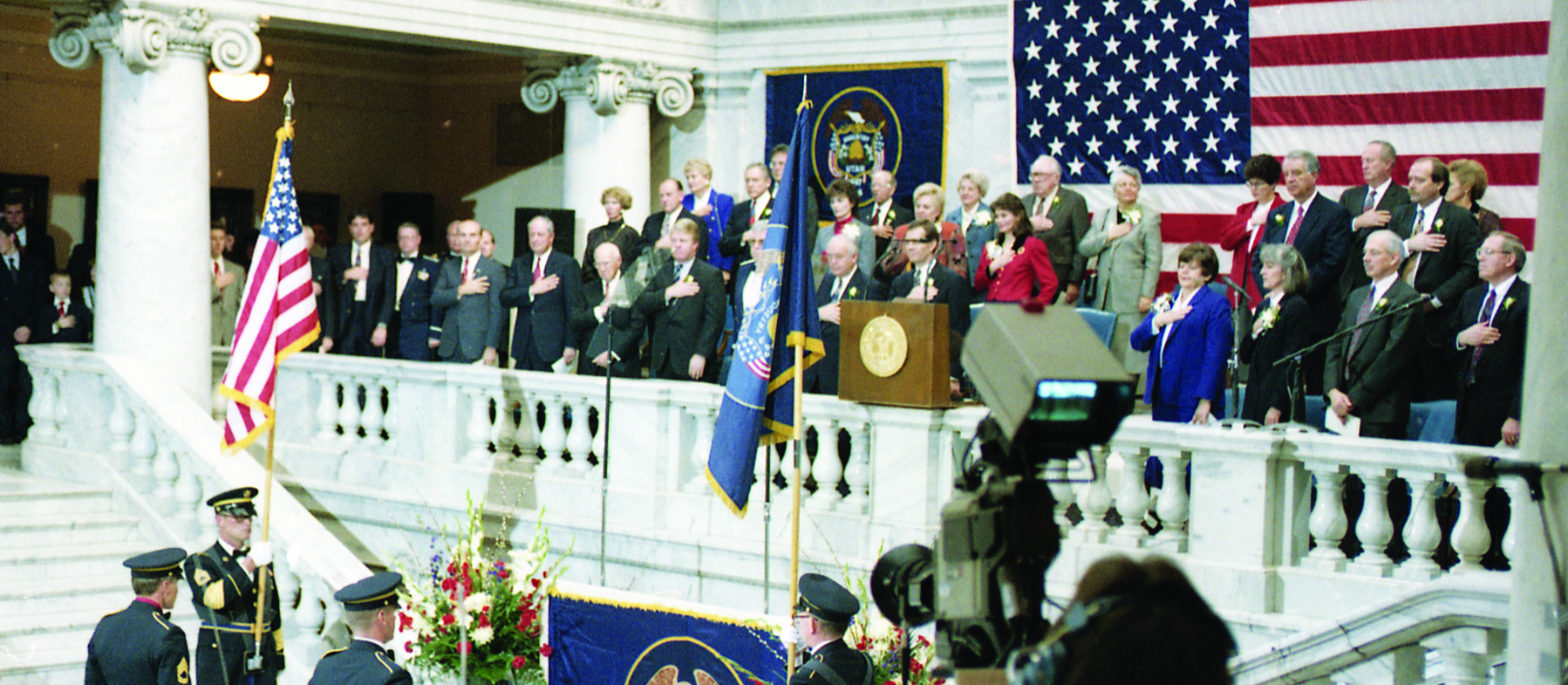
A number of impressions flood your mind during an occasion like this. You take in all the sights and sounds of such a grand assemblage. You’re aware, abstractedly, of the enormity of the moment. You’re vividly clear on what you need to do to execute it, and know that you must perform in a sense, but not overdo it.
I was aware that history would capture this moment, and that my actions should comport in a certain way. I clasped Jackie’s hand and we raised our other arms in a celebratory wave.
Amid the satisfaction of having achieved a high position and the excitement and grandeur of the event itself, there was a humorous flashback that kept me grounded. Standing on those marble stairs outside the Supreme Court chambers, my mind raced back to my friend, Dan Eastman. We met twenty years earlier as aspiring professionals, and had become the closest of friends. He had called the night before to say he was driving down the road when the thought popped into his head: “Tomorrow, Mike Leavitt is going to be governor.” The idea of his buddy elevated in that manner struck him as hilarious. He had just burst out laughing.
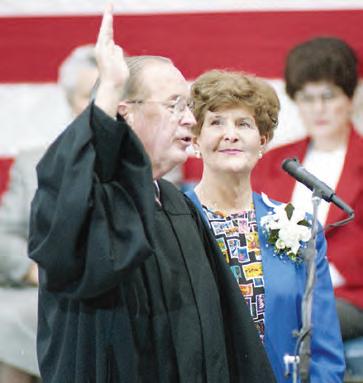
The retelling had cracked me up as well when he told me, and it made me smile now. To some extent I felt the same way—I knew I was going to be governor, but the thought of it didn’t overwhelm me as much as it amused me. The absurdity of it deep down, that this had actually happened, gave me considerable mirth.
Then, as a twenty-one-gun salute shook the walls, I stepped forward to the podium for the inaugural address.
Inaugural speeches should be different than other speeches a political leader gives. They are personal expressions of vision, leadership, and values, and less about programs, strategy, or tactics. They are a place where a bit of moralizing is acceptable. In retrospect, my first inaugural, while sincere, was too long, included too many stories, and could have been stated with more efficiency. However, it firmly established the purposes of my service and expressed my view of government’s role.
I, Michael Okerlund Leavitt, do solemnly swear...
The speech highlighted five objectives, which would carry on through all three of my terms as governor:
1) Improving Utah’s education system; 2) Building a stronger economy around higher-paying jobs; 3) Protecting our state’s quality of life;
4) Assuring that government did not grow faster than the private sector; and 5) Using government to reinforce and foster self-reliance and personal charity. It also affirmed my view that the federal government had become too large and dominant in the lives of Americans. “I believe governors of this nation will ultimately need to take a historic stand to demand discipline, sanity and a better balance in the federal system,” I told the gathering. “I intend to be part of that effort.”
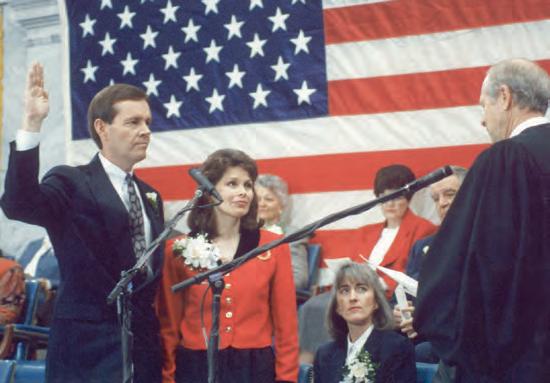
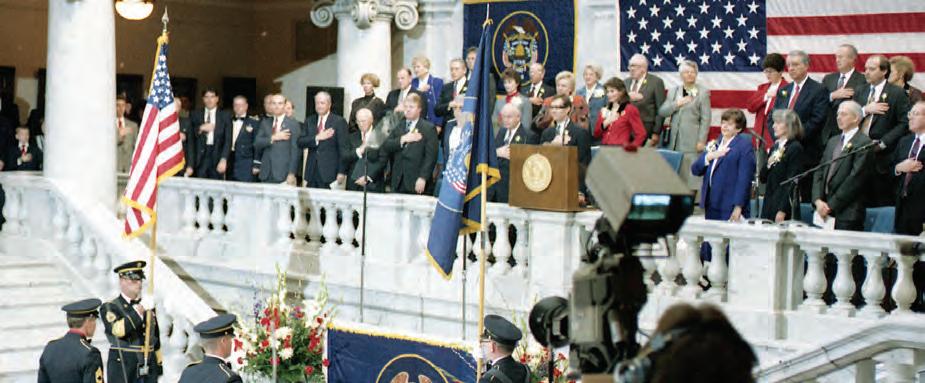
To cap the speech off, I reached back to home and family, specifically the words of my mother, Anne Leavitt. She had written a note to congratulate me, and in it was a nugget of motherly advice. I read the note verbatim:
Dear Michael,
When you were a little boy and television had just come to our town, the show you never missed was Gunsmoke. Strangely, the part you liked the most occurred before the episode began. It was the part where Matt Dillon rode his horse up the ridge, paused, leaned forward on the saddle horn, and described the rigors of being a U.S. Marshall in Dodge City. In a perfect imitation, you used to gallop your stick horse though the house, stopping at appropriate intervals to declare in your deepest four-year old voice, “It’s a chancey job, and a little lonely.”
Well, here you are again, son… a chancey job, this time for real. But I have a strong sense of security knowing what you understand so well. That in this job, as in any other, even when you feel lonely, you really never need to be alone.
The following day, when I was by myself in the governor’s ceremonial office, I felt a distinct and familiar impression that my mother’s reminiscence was right—I need never be alone in that role.
After the inaugural ceremony, a reception was held in the Gold Room of the Capitol. It was a festive moment, but it was also very much something we wanted and needed. We felt profoundly indebted to so many people who had sustained us and helped us win. We knew nearly everyone who attended, more than a thousand people. We hugged or shook hands with each and celebrated for just a moment with all.
All the newly sworn state officers were in the line, and so it moved at a snail’s pace. I was getting increasingly uncomfortable having people wait. Necessity being the mother of invention, Jackie and I invented the reverse moving reception line. Rather than wait for people to travel to us, we grabbed the security team and said, “Follow us.” We began working our way up the reception line. The hand shaking, hugging, and celebrating continued, but at a much faster pace.
Mid-afternoon, we left the Capitol to officiate in further inaugural events, which would go on for an entire week. And in my first “official” trek down State Street, I had a new handle as well. Utah Highway Patrol Sgt. Alan Workman, who would be with me as part of my security detail for the entire period in office, handed me the UHP radio and said, “Tell them, ‘This is Car One, I’m 10-41.’” The car the governor is riding in, no matter what car it is, carries the law enforcement handle of “Car One,” he explained. A series of codes or shorthand must be memorized by every police officer for radio use. Each one starts with the number 10. Code 10-41 means, “I’m signing on duty.”
My thumb pressed the key. “This is Car One,” I said. “I’m 10-41.” And so I was. 10-41 for the next 3,961 days, three elections, and one turn of a century.










